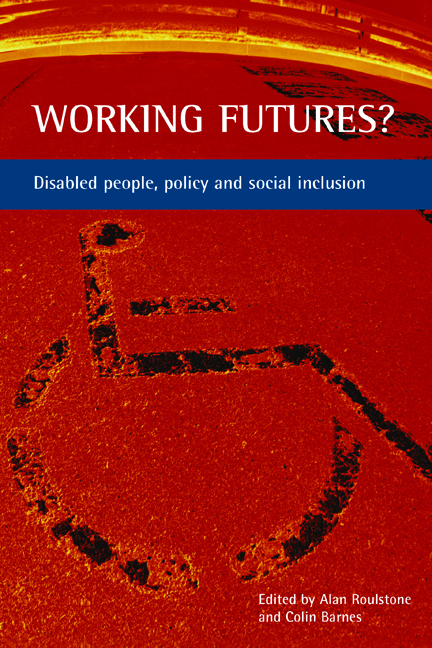Book contents
- Frontmatter
- Contents
- List of figures, tables and boxes
- Preface
- Acknowledgements
- List of abbreviations
- Notes on contributors
- Introduction Working futures: disabled people, employment policy and social inclusion
- Part One Work, welfare and social inclusion: challenges, concepts and questions
- Part Two The current policy environment
- Part Three Towards inclusive policy futures
- Index
- Also available from The Policy Press
eleven - Disability and employment: global and national policy influences in New Zealand, Canada and Australia
Published online by Cambridge University Press: 18 January 2022
- Frontmatter
- Contents
- List of figures, tables and boxes
- Preface
- Acknowledgements
- List of abbreviations
- Notes on contributors
- Introduction Working futures: disabled people, employment policy and social inclusion
- Part One Work, welfare and social inclusion: challenges, concepts and questions
- Part Two The current policy environment
- Part Three Towards inclusive policy futures
- Index
- Also available from The Policy Press
Summary
The study of social policy in the post-war period focused on the activities of nation-states and in particular the development of welfare state institutions. During this time, the range of policy actors: politicians, bureaucrats, pressure groups and voters, all held the belief that domestic intervention could help shape the economic and welfare futures of the population, mitigating any international turbulence that arose. While the 1960s and 1970s witnessed growing interest in comparative and cross-national analysis, the nation-state still remained the basic unit of analysis in these endeavours. During more recent decades however a suite of global changes have lent social policy formation a trans-national character, with recognition that policy problems, policy processes, policy actors, and policy solutions avoid being neatly mapped onto individual nation-states.
Those writing about globalisation fall into one of three broad camps: the hyperglobalists, the sceptics, and the transformationalists (Held et al, 1999). For hyperglobalists, global economic and/or technological processes reduce the influence that nation-states previously exerted over domestic policy, and imperatives to maintain a lean and competitive economy constrain domestic government setting and achieving policy goals. Under this perspective, the demands of global capital present a stark future for welfare states with reduced public expenditure and tighter eligibility, while education and training service the supply-side requirements of the economy. So-called sceptics deny the magnitude and novelty of global changes, arguing instead that domestic policy remains the route to forging an inclusive society. For Hay and Watson (1999, p 421), globalisation is a ‘rhetorical façade’ and becomes yoked to a defeatist view that no alternative exists to the homogenous policy measures that are advanced in the name of globalisation. For many sceptics, the organisation and mobilisation of interests within the nation-state and the courage to take alternative policy directions remains the route to securing social justice. For the transformationalist view, states retain the possibility of efficacious action, albeit those nationstates must now operate within new boundary conditions.
The field of disability studies – as distinct from the study of disability within the traditional social administration/policy paradigm – has always had a more international and global character. While recognising that the social and economic outcomes experienced by disabled people and particular communities within the broader population are shaped in part by domestic conditions, it has always upheld trans-national considerations within analysis.
- Type
- Chapter
- Information
- Working Futures?Disabled People, Policy and Social Inclusion, pp. 165 - 174Publisher: Bristol University PressPrint publication year: 2005



